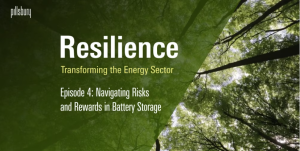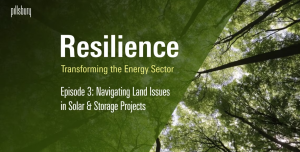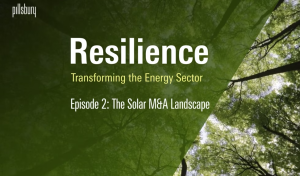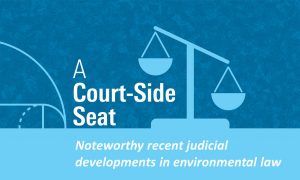Critical materials—the collective term for metals and minerals essential for all kinds of advanced technology and clean energy—are vital to the growth of artificial intelligence (AI), which has become pervasive in everyday life. AI hardware relies on familiar elements like aluminum, silicon and copper, and unfamiliar elements like gallium, germanium, palladium and neodymium to support the computational power, data transmission, and cooling systems required to process vast amounts of data at high speeds.
Resilience: Transforming the Energy Sector – Navigating Risks and Rewards in Battery Storage | Episode 4 (12.18.24)
 In the newest episode of Resilience, Pillsbury’s Shellka Arora-Cox and guest Adam Hise, Managing Director of Storage Risk Solutions for Ascend Analytics, dive deep into the evolving world of battery storage, market volatility, and how companies are navigating risk in a dynamic energy landscape.
In the newest episode of Resilience, Pillsbury’s Shellka Arora-Cox and guest Adam Hise, Managing Director of Storage Risk Solutions for Ascend Analytics, dive deep into the evolving world of battery storage, market volatility, and how companies are navigating risk in a dynamic energy landscape.
Trump 2.0: Electric Vehicles (EVs) and Emissions Requirements
In a potential blow to the fledging EV transition, reports have noted that the Trump transition team is planning to terminate the $7,500 consumer EV credit, an action publicly supported by Elon Musk.
Real Estate & Construction News Roundup (12/4/24) – Highest Rate of Office Conversions, Lending Caps for Fannie Mae and Freddie Mac and Affordability Challenges for Homebuyers
In our latest roundup, infrastructure-related ballot initiatives, U.S. Green Building Council’s success stories, support for sustainable building, and more!
Prime Contractors, Subcontractors and the Role of Default Notification in SDI Coverage
Subcontractor Default Insurance (SDI) is marketed as a substitute for a subcontractor performance bond, providing coverage for a prime contractor’s losses due to a subcontractor’s failure to perform on a project. In a recent article for the American Bar Association, colleagues Michael S. McNamara and Lexie R. Pereira dispel a common misconception regarding whether a subcontractor must be declared in default to trigger SDI coverage under several common policy forms.
To read “The Silent ‘D’ in SDI: Subcontractors May Not Need to be Notified of Default for Prime Contractors to Receive Subcontractor Default Insurance Coverage,” click here.
Resilience: Transforming the Energy Sector – Navigating Land Issues in Solar and Storage Projects | Episode 3 (11.14.24)
 In the latest episode of the Resilience podcast, colleague Shellka Arora-Cox and Laura Pagliarulo, CEO and founder of SolaREIT, get down to the nitty-gritty in a discussion of the interplay of solar power capacity, generation and land use.
In the latest episode of the Resilience podcast, colleague Shellka Arora-Cox and Laura Pagliarulo, CEO and founder of SolaREIT, get down to the nitty-gritty in a discussion of the interplay of solar power capacity, generation and land use.
Developers Can Tap into DOE’s $400 Million for Remote and Rural Clean Energy Projects
 On October 3, 2024, the Department of Energy Office of Clean Energy Demonstrations announced a Notice of Funding Opportunity (NOFO) to fund up to $400 million for clean energy projects in rural and remote areas via its Energy Improvements in Rural or Remote Areas program. The NOFO will provide awards ranging from $2 million – $50 million, with plans to fund 20 to 50 projects. Awards will require a non-federal cost share, range across four topic areas, and target projects in rural and remote communities with populations of 10,000 people or fewer.
On October 3, 2024, the Department of Energy Office of Clean Energy Demonstrations announced a Notice of Funding Opportunity (NOFO) to fund up to $400 million for clean energy projects in rural and remote areas via its Energy Improvements in Rural or Remote Areas program. The NOFO will provide awards ranging from $2 million – $50 million, with plans to fund 20 to 50 projects. Awards will require a non-federal cost share, range across four topic areas, and target projects in rural and remote communities with populations of 10,000 people or fewer.
The 2023 Term of the Supreme Court: Administrative and Regulatory Law Rulings
It is instructive to review the Supreme Court’s record in its most recent term, concentrating on regulatory and administrative law cases, which are usually back-burner issues. But not this term.
The Supreme Court began the current term on October 7, 2024. The Court has already chosen many cases to review in the new term, and it promises to be as interesting as the 2023 term, which produced several significant rulings affecting regulatory and administrative law, chiefly the Loper Bright Enterprises ruling. Loper Bright overturned the Court’s landmark administrative law ruling of Chevron, USA v. Natural Resources Defense Council, Inc., 467 U.S. 837 (1984).
Resilience: Transforming the Energy Sector – The Solar M&A Landscape | Episode 2 (10.23.24)
 In the latest episode of the Resilience podcast, colleague and host Shellka Arora-Cox sits down with Kevin Yaich, head of M&A at Qcells USA, for a discussion of the current solar M&A landscape.
In the latest episode of the Resilience podcast, colleague and host Shellka Arora-Cox sits down with Kevin Yaich, head of M&A at Qcells USA, for a discussion of the current solar M&A landscape.
When Every Drop Matters, Cities Turn to Watertech
 We all need water to survive—but access to the liquid lifeline isn’t always a given. With a shifting climate and ever-increasing agricultural and industrial demands on this limited commodity, UNICEF predicts that by 2025, half of the world’s population could be living in areas facing water scarcity. On top of the obvious resource drains, many countries are losing surprising amounts of potable water to leaks. For example, in the United States alone, an estimated 6 billion gallons of treated drinking water seep out of its supply every day due to aging pipelines and undetected leaks.
We all need water to survive—but access to the liquid lifeline isn’t always a given. With a shifting climate and ever-increasing agricultural and industrial demands on this limited commodity, UNICEF predicts that by 2025, half of the world’s population could be living in areas facing water scarcity. On top of the obvious resource drains, many countries are losing surprising amounts of potable water to leaks. For example, in the United States alone, an estimated 6 billion gallons of treated drinking water seep out of its supply every day due to aging pipelines and undetected leaks.





